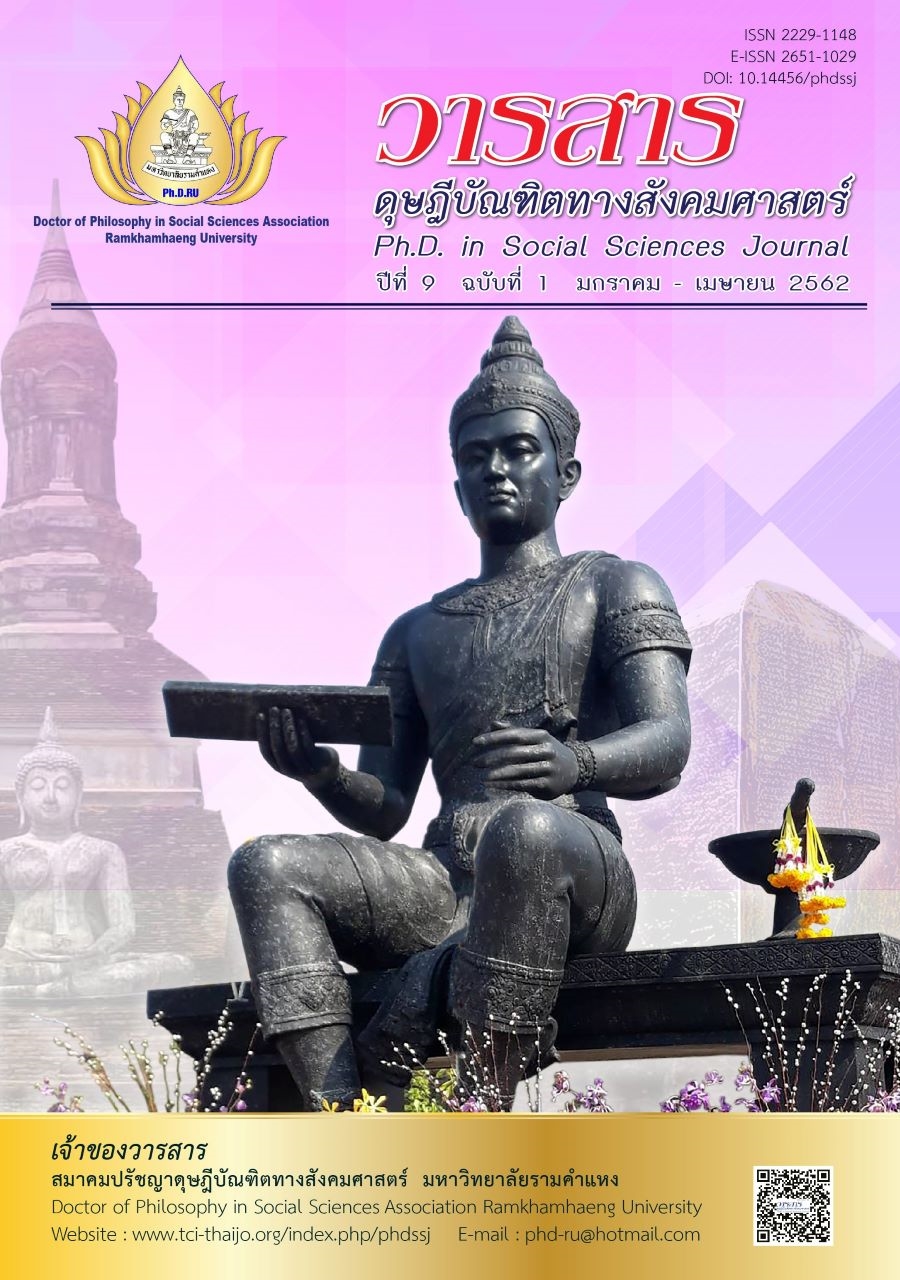Factors Influencing the “Thinking” (“khit pen”) of Undergraduates at Institutions of Higher Education in the Lower Northeastern Region thinking khit pen
Main Article Content
Abstract
The objectives of the research are as follows: (1) the levels at which are exhibited factors of interpersonal relationships, the self-concept, self-discipline, perceptions of information from the mass media, and the “thinking” (“khit pen”) of selected undergraduates at institutions of higher education in the lower northeastern region. (2) the relationships between all of the above factors and the “thinking” (“khit pen”) of these undergraduates. (3) the direct and indirect influence of the factors on the “thinking” (“khit pen”) of the students. The sample population consisted of 840 undergraduates selected from the research population.
The instruments of research a form used in measuring by the questionnaire. and a form employed for measuring the levels at which perceptions of information from the mass media were evinced. Using confirmatory factor analysis (CFA), the researcher also tested the construct validity of the forms.
Findings are as follows:
1. The students exhibited interpersonal relationships at a high level. The self-concept was at a high level. Self-discipline was at a high level. Perceptions of information from the mass media were at a high level. The “thinking” (“khit pen”) was evinced at the highest level.
2. The relationships between these factors and the “thinking” (“khit pen”) of the students were as follows: The correlation coefficients for all four factors showed relationships with “thinking” (“khit pen”) at the statistically significant level of .01.
3. The factor of self-discipline exhibited direct influence on the “thinking” (“khit pen”) at the highest level. The factors of interpersonal relationships, perceptions of information from the mass media exhibited indirect influence on the “thinking” (“khit pen”). The factor of interpersonal relationships exhibited the highest total influence on the “thinking” (“khit pen”) of the students under investigation.
Article Details
Academic articles, research articles, and book reviews in the Ph.D. in Social Sciences Journal are author’s opinions, and not the publisher’s, and is not the responsibility of the Ph.D. in Social Sciences Journal Philosophy Association, Ramkhamhaeng University. (In the case that research is done on human, the researcher has to be trained in Ethics for Doing Research on Human Training and has to produce the evidence of the training).
References
Ercan, L. E. (2010). An analysis of the relationship between attitudes towards seeking psychological help and problem solving amonguniversity students. Procedia-Social and Behavioral Sciences, 2(2), 1814-1819.
Hajiyakhchali, A. (2013). The effects of ereative problem solving process training on academic well-being of shahid Chamran University Students. Procedia-Social and Behavioral Sciences, 84(9), 549-552.
Maneewong, C. (n. d.). Student affairs administration. Bangkok: Amonkanpim. [In Thai]
Ministry of Education Office, the Education Council. (2011). The main policy to drive education reform in the second decade (A.D. 2554-2561). Retrieved November 30, 2018, from https://www.onec.gp.th [In Thai]
Office of the Non-Formal and Informal Education. (2008). Solve problems with “Thinking” (“khit pen”) processes. Retrieved November 30, 2018, from https://202.143.165.163/ebook_think [In Thai]
Phra Prom Khunaporn (P. A. Puyutto). (2012). Life manual. Bangkok: Amarin Printing. [In Thai]
Parsons, T. (1960). Administrative science quarterly: Effective of size, complexity and ownership in administrative intensity. New York: Holt, Rinehart, & Winston.
Panich, V. (2012). The way to create learning for students in the 21st Century. Bangkok: The Freshman Srisarindwiwong. [In Thai]
Poopunsri, V., & Dumrongpol, D. (2011). Applied developmental psychology in education. Bangkok: Ramkhamhaeng University Press. [In Thai]
Sanglerduthai, C. (2008). Factors affecting on self-discipline of student Nakhon Pathom Rajabhat University. Journal of Education, Khon Kaen University, 32(4), 47-53. [In Thai]
Smuttai, R. (2013). Pilot research to develop teacher production curriculum for the 21st Century. The national academic conference on educational research office of the secretary of education. Bangkok: Ministry of Education. [In Thai]
Sindhusen, U. (2016). “Thinking” (“khit pen”) of a world change. Bangkok: Phutawan. [In Thai]
Thitikunjaroen, S., & Suvachittanont, W. (2010). RU students’ listening behaviors and needs on educational radio programs. Bangkok: Ramkhamhaeng University Press. [In Thai]
Vorapipat, K. (2001). Thinking idea is to “make life with “thinking” (“khit pen”).” Bangkok: Mahachulalongkornrajavidyalaya University. [In Thai]
Wei, S. (2016). Harvard University’s world’s best teaching method, volume 2: The course of success for people who know how to think “thinking” (“khit pen”). Jiraporn Netsombat, (translator and compiler). Bangkok: B Media. [In Thai]
Wiratchai, N. (1999). LISREL model: Statistical analysis for research (3rd ed.). Bangkok: Chulalongkorn University Press. [In Thai]
Yoelao, D., Langka, W., Pimthong, S., & Peungposop. (2013). The evaluation of watching movies for enhancing inspiration of undergraduate students at Srinakharinwirot University. Bangkok: Srinakharinwirot University, Behavioral Science Research Institute. [In Thai]


